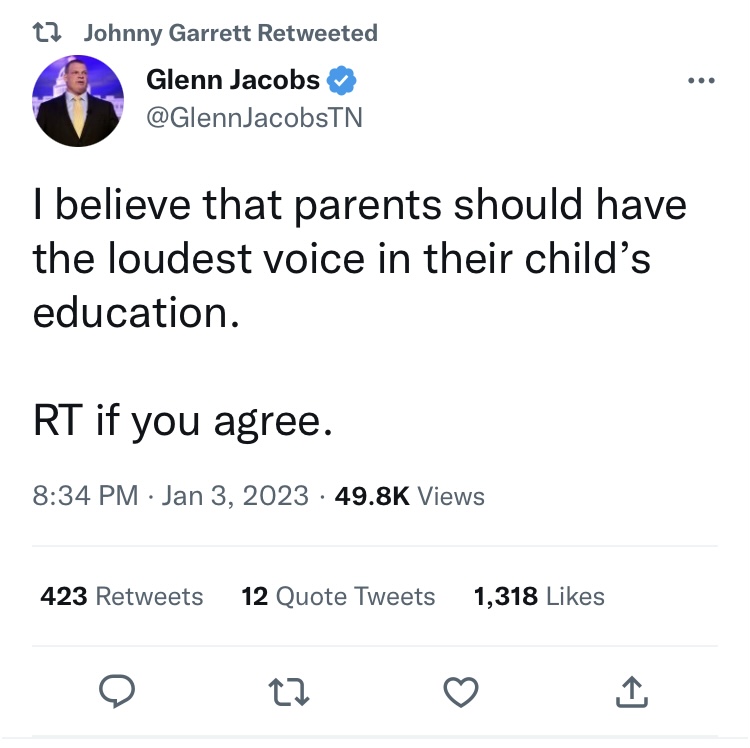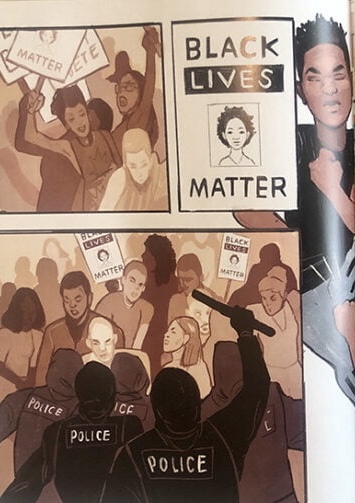THE GREAT RETENTION

The trash heap of educational reforms is littered with decisions made by armchair educators far away from the very students impacted by those decisions. In Tennessee, like most other states, well-intentioned politicians regularly debate and codify impractical ideas that adversely impact public education. Soon after, unelected educational bureaucrats, far removed from the classroom, applaud these new laws, revise TDOE and TSBA policies, and chaos ensues. Perhaps the only thing that ever changes is the order of the nonsense. Sometimes the old switcheroo happens, where the bureaucrats initiate the madness by proposing the reforms that subsequently get codified by the politicians. Either way, it’s a public education tale as old as time, and it would be comical if it weren’t exceedingly problematic and increasingly detrimental to children.
The most recent example in Tennessee comes in the form of T.C.A 49-6-3115, more commonly referred to as the Third Grade Retention Law. The law does not automatically require retention for a 3rd grader who performs below proficient on the state’s annual reading test. The law simply targets students who perform below a threshold deemed acceptable by the state legislature and then requires those students to navigate a confusing flow chart of contingencies until they successfully check enough boxes to be promoted, contingencies that will presumably cure their perceived academic ailments and magically open the door to fourth grade success.
T.C.A 49-6-3115 was passed by the Tennessee General Assembly in 2021 and scheduled to take effect in school year 2022-2023. Educators were remarkably quiet in the days and months between the passage of the law and its implementation. Perhaps we all assumed that the state legislature would come to its collective senses. We were wrong, and the chaos has begun. Tennessee schools are currently scrambling in preparation to retain an estimated 65% of our current 3rd graders…or provide legally prescribed interventions to avoid The Great Retention.
In spite of this chaos, educators don’t have to wonder what the fallout from the retention law will look like on our campuses. We have TCAP data from both 2021 and 2022. Analyzing 3rd grade ELA test results for current 4th graders can provide administrators with a pretty clear idea of what we can expect with regard to how many students are in jeopardy of being retained. But analyzing both 3rd and 4th grade ELA test results for current 5th graders yields even better information. In other words, not only can we predict the practical fallout, we can also estimate the number of students who will be unnecessarily punished by the law.
Are legislators aware that some students have historically scored somewhere BELOW PROFICIENT as 3rd graders, and then AT OR ABOVE PROFICIENT as 4th graders? It’s a verifiable fact. Do these politicians understand that many students manage to achieve grade-level reading proficiency without the burdensome interventions now codified into state statute? And the back-to-back testing years of 2021 and 2022 are not anomalies as they pertain to this fact; consecutive testing cycles prior to the pandemic reveal similar patterns.
The relatively small sample size to which I have access as a building administrator provides an interesting opportunity for analysis, although it would be fairly difficult to extrapolate these data beyond the walls of our specific school. The diversity of public schools across the state—and even within the same district—makes it impractical to generalize my findings, although I suspect that most administrators would find something similarly alarming within their own buildings. Make no mistake, some students will be unnecessarily retained if this law is not changed or repealed. The findings for my school are summarized in the list below.
- Number of 5th graders currently enrolled: 137
- Number of regular ed 5th graders who took the ELA TCAP on this campus as both 3rd and 4th graders: 83
- Number of regular ed 5th graders who took the ELA TCAP as both 3rd and 4th graders and scored somewhere BELOW PROFICIENT as 3rd graders: 19
- Number of regular ed 5th graders who took the ELA TCAP as both 3rd and 4th graders and scored somewhere BELOW PROFICIENT as 3rd graders BUT AT OR ABOVE PROFICIENT as 4th graders: 7
At my school, in other words, if the retention law had been actionable in 2021, exactly 19 of my rising 4th graders would have been in jeopardy of retention. That number represents an entire class of retained students. More alarmingly, 7 of these 19 students (more than 36%) would have been mistakenly targeted, given their subsequent score of proficient (or better) on their 4th grade TCAPs. It is important to reiterate that these year-over-year score improvements occurred without the new interventions required by the retention law. The takeaway? Promotion and retention decisions should never be made based upon a single data point. Educators understand this, and that’s why these types of decisions are best made as close to the students as possible and in collaboration with parents.
The deeply flawed law we now know as T.C.A 49-6-3115 was debated and passed by elected officials on Capitol Hill, many of whom have their own children or grandchildren enrolled in private schools (and effectively insulated from their overreaching legislation). The bill was signed into law by our governor, a mechanical engineer by trade and a cattle farmer by the grace of God. And now the unelected and underpaid folks at the TDOE have been left to manage the confusion the law has created. It’s a sad but familiar pattern for Tennessee educators. The TDOE’s best attempts at damage control can be found in the form of an incomplete list of FAQs available here. District- and school-level educators likely have a few more FAQs, some of which will be shared in an upcoming blog post.
The optimal decisions for public school students are made as close to those students as possible. Parents and teachers are clearly the closest. Here in Tennessee, Capitol Hill and Andrew Johnson Tower—the places where laws and policies are enacted—are hundreds of miles away from many of the students impacted by these directives. What a shame.
To conclude for now, is anyone else in favor of reminding elected officials and bureaucrats that Tennessee students are better governed by the educators within their schools and their districts? When it comes to decision-making for Tennessee’s public schools, the proximity of the decision makers will always determine the efficacy of the decisions. It really is as simple as location, location, location.




 Let’s get back to school. Let’s get back to friendships, potato smiles, and learning. It’s time for students to enjoy some normalcy in a fun and familiar place. For many children, life away from school is neither normal, nor fun, and it would be a mistake for us to presume otherwise. Classrooms were built for learning and laughter; taxes were paid to educate kids in the most optimal way. It’s time for the majority of us to answer the school bell in person, at least those who can safely do so.
Let’s get back to school. Let’s get back to friendships, potato smiles, and learning. It’s time for students to enjoy some normalcy in a fun and familiar place. For many children, life away from school is neither normal, nor fun, and it would be a mistake for us to presume otherwise. Classrooms were built for learning and laughter; taxes were paid to educate kids in the most optimal way. It’s time for the majority of us to answer the school bell in person, at least those who can safely do so.
 Last night something strange happened. I watched a regular season hockey game on TV in its entirety. To make sure I experienced the totality of the event, I watched the pre-game, the post-game, and the intermission reports. Stranger still, this was a Thursday night when I could have been—normally would have been—watching the Philadelphia Eagles at the Carolina Panthers. That’s right, I chose to watch grown men on ice skates (okay, the Stars vs. the Predators) instead of an NFL game between two teams that were leading their respective divisions. I chose the NHL over the NFL last night, and it was absolutely magnificent. Surely this is a sign of the Apocalypse.
Last night something strange happened. I watched a regular season hockey game on TV in its entirety. To make sure I experienced the totality of the event, I watched the pre-game, the post-game, and the intermission reports. Stranger still, this was a Thursday night when I could have been—normally would have been—watching the Philadelphia Eagles at the Carolina Panthers. That’s right, I chose to watch grown men on ice skates (okay, the Stars vs. the Predators) instead of an NFL game between two teams that were leading their respective divisions. I chose the NHL over the NFL last night, and it was absolutely magnificent. Surely this is a sign of the Apocalypse. Heck, I even went to hockey games. In the early to mid 90s, my wife and I would cheer on Nashville’s minor league hockey team, the Knights, in person at the UFMA (Unidentified Flying Municipal Auditorium). Fresh out of college and newly married with no kids, these were double date nights with dear friends—friends who also went to church with a UFMA usher. Don’t judge me. Sure we got in free, but I paid for every single bag of deep-fried mini-donuts I bought from the concession guy, and I ate thousands of those things. Think round, bite-sized funnel cakes. Whatever I didn’t eat, I generally wore home. Clearly, I was a hockey concession supporter at the very least.
Heck, I even went to hockey games. In the early to mid 90s, my wife and I would cheer on Nashville’s minor league hockey team, the Knights, in person at the UFMA (Unidentified Flying Municipal Auditorium). Fresh out of college and newly married with no kids, these were double date nights with dear friends—friends who also went to church with a UFMA usher. Don’t judge me. Sure we got in free, but I paid for every single bag of deep-fried mini-donuts I bought from the concession guy, and I ate thousands of those things. Think round, bite-sized funnel cakes. Whatever I didn’t eat, I generally wore home. Clearly, I was a hockey concession supporter at the very least. Worse for the Predators, Adelphia Coliseum, a 69,000 seat football stadium, was being built just across the Cumberland River from the GEC. Thanks to a Music City Miracle and a Super Bowl run in 2000, Tennessee’s new NFL team, the Titans, had captivated the collective interest of what was already a dyed-in-the-wool football town. Nashville was absolutely rabid over the Titans. So rabid in fact, the city threw a Super Bowl LOSER parade…and more than 20,000 people attended…in 33 degree weather. A teacher at the time, I had students skip school to attend the parade. I excused their absences.
Worse for the Predators, Adelphia Coliseum, a 69,000 seat football stadium, was being built just across the Cumberland River from the GEC. Thanks to a Music City Miracle and a Super Bowl run in 2000, Tennessee’s new NFL team, the Titans, had captivated the collective interest of what was already a dyed-in-the-wool football town. Nashville was absolutely rabid over the Titans. So rabid in fact, the city threw a Super Bowl LOSER parade…and more than 20,000 people attended…in 33 degree weather. A teacher at the time, I had students skip school to attend the parade. I excused their absences. Music City is now a hockey town, and a mediocre Titans team (whose last playoff win came in 2003 with Steve McNair at QB) should consider itself fortunate and humbly pick up the second fiddle. The funny thing about the ice-skating Europeans, Russians, and Canadians is that they all stand for our National Anthem, likely recognizing the uniqueness of their American opportunity and possibly even remembering real oppression in some of their home countries.
Music City is now a hockey town, and a mediocre Titans team (whose last playoff win came in 2003 with Steve McNair at QB) should consider itself fortunate and humbly pick up the second fiddle. The funny thing about the ice-skating Europeans, Russians, and Canadians is that they all stand for our National Anthem, likely recognizing the uniqueness of their American opportunity and possibly even remembering real oppression in some of their home countries. though she boarded as part of the “B” group. Her excitement reminded me of my first flight many, many years ago and my surprise to find that Earth looks much different from above. I remember being shocked at the efficiency with which mankind had managed to subdivide God’s creation. Geometry took on a new meaning for me that day, as I peered out the small window to see squares, rectangles, and circles in various shades of green. In fact, the blues of the water seemed to be the only creation unmodified by property owners and surveyors. But even some of the blues were manmade shapes. God supplied the water, true, but humans still managed to figure out how to shape the reservoirs in many cases. Isn’t it interesting how the created insist upon helping the Creator?
though she boarded as part of the “B” group. Her excitement reminded me of my first flight many, many years ago and my surprise to find that Earth looks much different from above. I remember being shocked at the efficiency with which mankind had managed to subdivide God’s creation. Geometry took on a new meaning for me that day, as I peered out the small window to see squares, rectangles, and circles in various shades of green. In fact, the blues of the water seemed to be the only creation unmodified by property owners and surveyors. But even some of the blues were manmade shapes. God supplied the water, true, but humans still managed to figure out how to shape the reservoirs in many cases. Isn’t it interesting how the created insist upon helping the Creator?